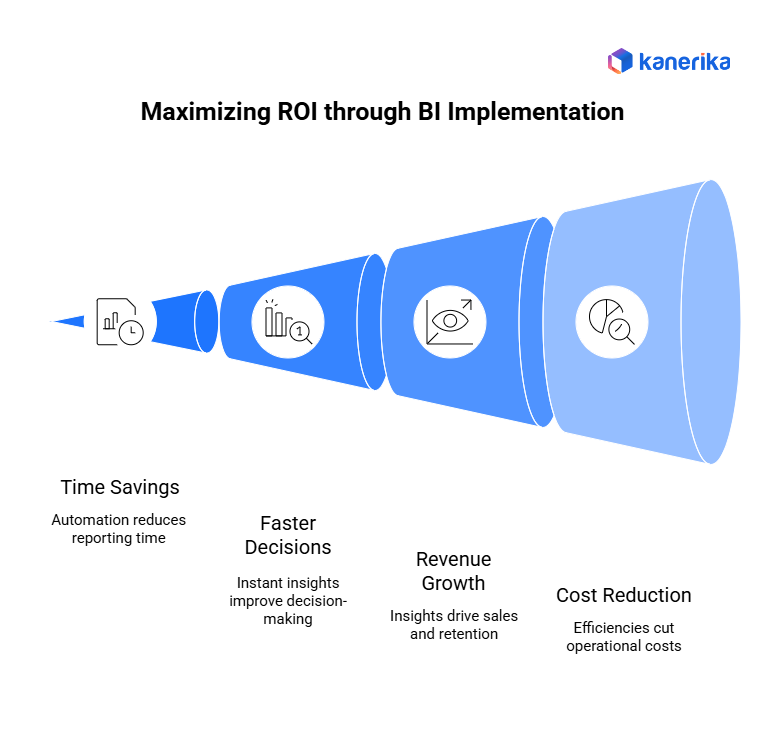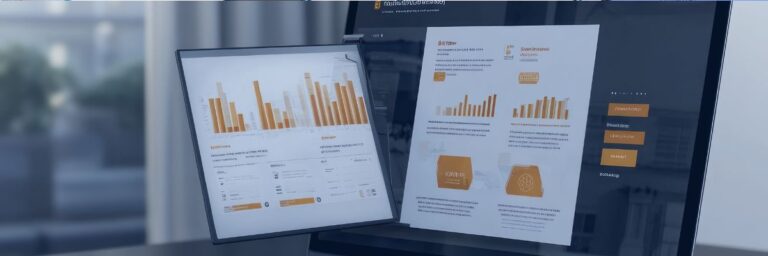Most companies sit on mountains of data but struggle to use it. According to Gartner’s analytics research, both Power BI and Tableau maintain a 4.4-star rating from over 3,000 reviews, yet many businesses still can’t turn their dashboards into actual decisions. The problem isn’t the tools. It’s finding the right business intelligence consulting services that understand your specific needs.
Chipotle, a reputed Mexican Restaurant company implemented BI solutions across 2,400 locations to monitor operational efficiency through dashboards, standardizing reporting and saving thousands of hours company wide. Norwegian health authority Helse Vest reduced report building time from 14 days to less than one day after implementing Power BI across 50 healthcare facilities. These companies didn’t just buy software. They worked with consultants who understood their operations and built systems their teams actually use.
Choosing business intelligence consulting services means picking someone who’ll work with your team, not just deliver a dashboard and leave. You need consultants who ask questions about your processes, understand your industry, and stick around to make sure people actually use what gets built. The wrong choice wastes budget. The right one transforms how your business runs.
Key Takeaways
- Business intelligence consulting services transform raw data into actionable insights through strategy development, dashboard creation, ETL implementation, and ongoing support
- Healthcare, finance, retail, manufacturing, and real estate industries benefit most from BI consulting due to complex data requirements and regulatory compliance needs
- Essential consultant qualities include relevant certifications, proven track record with documented ROI, transparent pricing structure, strong communication skills, and data security expertise
- Measure BI success through time saved on reporting, faster decision-making speed, revenue impact from insights, and cost reduction from operational efficiencies
What Are Business Intelligence Consulting Services?
Business intelligence consulting services help companies turn raw data into useful information for better decisions. BI consultants work with your team to design, build, and implement systems that collect data from different sources, clean it up, and present it through dashboards and reports.
These services cover several areas. Data warehousing brings information from sales systems, customer databases, and operational tools into one place. ETL processes extract, transform, and load data so it’s accurate and ready to use. Dashboard creation gives your team visual tools to track metrics that matter. The average hourly rate for BI consulting ranges between $25 and $49 per hour, though project costs vary based on complexity.
Most BI consulting firms also provide training so your employees can actually use the systems. They don’t just drop off software and leave. Good consultants stick around to fix issues, add features, and make sure people adopt the tools. The goal is making data accessible to everyone who needs it, not just technical teams.
Elevate Your Enterprise Reporting with Expert BI Consulting Services!
Partner with Kanerika for Data Modernization Services
What BI Consultants Actually Do?
1. Data Strategy Development
BI consultants start by understanding how your business works and what decisions you need data for. They map out where your data lives, who needs access to it, and what questions you’re trying to answer. This planning phase prevents you from building dashboards nobody uses or tracking metrics that don’t matter.
- Assess current data infrastructure and identify gaps in reporting
- Define key performance indicators aligned with business goals
- Create a roadmap for BI implementation with clear timelines and milestones
2. Dashboard and Report Creation
Consultants design visual dashboards that show real-time business performance at a glance. They choose the right charts and graphs so your team can spot trends quickly without digging through spreadsheets. Simple dashboards typically cost between $70 and $199, while complex dashboards with custom features require more investment.
- Build interactive dashboards customized for different departments and roles
- Create automated reports that update without manual data entry
- Design mobile-friendly views so teams can check metrics anywhere
3. ETL Process Implementation
ETL stands for extract, transform, and load. Consultants build pipelines that pull data from your CRM, accounting software, and other systems automatically. They clean up duplicates, fix formatting issues, and combine everything into a data warehouse where it’s ready for analysis.
- Connect multiple data sources into one unified system
- Set up automated data quality checks to catch errors early
- Schedule regular data refreshes so information stays current
4. Platform Selection and Setup
Choosing between Power BI, Tableau, or other BI tools depends on your budget, existing tech stack, and team’s technical skills. Consultants evaluate options based on your needs, handle the technical setup, and configure security so the right people see the right data.
- Compare BI platforms based on features, cost, and ease of use
- Install and configure chosen software with proper user permissions
- Integrate BI tools with existing business applications and databases
5. Training and Knowledge Transfer
The best BI system fails if nobody knows how to use it. Consultants train your team on building reports, filtering data, and finding answers to their questions. They create documentation and hold workshops so employees feel comfortable exploring data on their own.
- Conduct hands-on training sessions for different user groups
- Develop user guides and video tutorials for ongoing reference
- Provide office hours or support channels for questions after launch
6. Ongoing Support and Optimization
BI needs change as businesses grow. Consultants monitor system performance, add new data sources when needed, and optimize slow-running reports. They also update dashboards based on user feedback and evolving business priorities.
- Track system usage to identify what’s working and what’s not
- Add new features and data connections as requirements expand
- Troubleshoot technical issues and maintain data pipeline health
Which Industries Benefit Most from Business Intelligence Consulting?
1. Healthcare
Healthcare organizations use BI consulting to improve patient outcomes and reduce costs. Consultants build dashboards that track patient wait times, readmission rates, and treatment effectiveness. They also help hospitals manage revenue cycles, monitor insurance claims, and ensure compliance with regulations like HIPAA through secure data handling and reporting systems.
2. Finance and Banking
Financial institutions rely on BI for risk assessment, fraud detection, and regulatory compliance. Consultants create systems that analyze loan portfolios, track customer transactions for suspicious activity, and generate reports for SEC or FINRA requirements. Real-time dashboards help banks make faster lending decisions while monitoring market trends and customer profitability across different products and services.
3. Retail and E-commerce
Retailers use BI to optimize inventory, understand customer behavior, and increase sales. Consultants build tools that predict product demand, track which items sell together, and identify slow-moving stock. They also analyze online shopping patterns, abandoned cart data, and customer lifetime value to improve marketing campaigns and personalized product recommendations that drive repeat purchases.
4. Manufacturing and Supply Chain
Manufacturers implement BI to reduce downtime, improve production efficiency, and manage complex supply chains. Consultants create dashboards showing equipment performance, production bottlenecks, and quality control metrics. They also build predictive maintenance systems using IoT sensor data, helping factories avoid costly breakdowns and optimize inventory levels across warehouses and distribution centers.
5. Real Estate and Construction
Real estate firms use BI to track project costs, manage subcontractor performance, and forecast market trends. Consultants develop systems that monitor budget versus actual spending, analyze property sales data, and predict rental income. They also create dashboards for construction timelines, resource allocation, and compliance tracking, helping developers complete projects on time and within budget constraints.
Data Visualization Tools: A Comprehensive Guide to Choosing the Right One
Explore how to select the best data visualization tools to enhance insights, streamline analysis, and effectively communicate data-driven stories.
What to Look for When Hiring BI Consultants
1. Essential Qualifications
Technical certifications prove a consultant knows their tools inside out. Look for Microsoft Power BI certifications, Tableau Desktop Specialist credentials, or vendor-specific training completion. Industry experience matters more than certifications alone because someone who’s worked in your sector understands the metrics and challenges you face without needing lengthy explanations.
- Check for relevant certifications like Microsoft Certified Data Analyst or Tableau Desktop Specialist
- Verify hands-on experience with the specific BI platform you’re considering
- Ask about industry-specific projects they’ve completed in your business sector
2. Proven Track Record
A solid portfolio shows what consultants have actually built, not just what they claim they can do. Request case studies with real results like time saved, costs reduced, or revenue improved. Client testimonials reveal how they communicate, meet deadlines, and handle problems when things go wrong during implementation.
- Review their portfolio of completed dashboards and BI implementations
- Request references from clients in similar industries or company sizes
- Look for documented results showing measurable business impact from their work
3. Clear Pricing Structure
Transparent pricing prevents budget surprises halfway through your project. Some consultants charge hourly rates, others use fixed project fees, and some offer monthly retainers for ongoing support. Power BI consultant rates range from $50 to $250 per hour depending on experience and location. Get detailed estimates that break down costs for setup, development, training, and maintenance.
- Ask for itemized quotes that separate software licenses from consulting fees
- Understand whether pricing includes revisions, training, and post-launch support
- Compare hourly rates versus project-based pricing to find what fits your budget
4. Communication Skills
Technical experts who can’t explain things in plain language create frustration and failed projects. Good consultants ask questions about your business, listen to concerns from different departments, and explain technical concepts without jargon. They should provide regular updates, respond promptly to questions, and adjust their approach based on your feedback.
- Evaluate how well they explain technical concepts during initial conversations
- Check their responsiveness to emails and willingness to schedule calls
- Ask about their reporting cadence and how they keep stakeholders informed
5. Data Security Knowledge
BI systems handle sensitive business information, customer data, and financial records. Consultants need to understand encryption, access controls, and compliance requirements for your industry. They should implement role-based permissions, so employees only see data relevant to their jobs, and explain how they’ll protect information from breaches or unauthorized access.
- Verify their understanding of relevant regulations like GDPR, HIPAA, or SOC 2
- Ask how they implement user permissions and data access controls
- Confirm they follow security best practices for data storage and transmission
6. Post-Implementation Support
The real work starts after launch when users encounter issues or need changes. Clarify what support looks like after the initial project ends. Some consultants offer training refreshers, bug fixes, and minor updates included in their fee. Others charge separately for ongoing maintenance, so understand these terms upfront to avoid service gaps.
- Determine what’s included in their warranty or support period after go-live
- Ask about response times for urgent issues versus routine enhancement requests
- Understand costs for ongoing support, system updates, and adding new features
7. Cultural Fit
Consultants become temporary members of your team, so personality and work style matter. They need to collaborate with your IT department, interview employees about their needs, and sometimes deliver difficult news about data quality issues. Find someone who matches your company’s communication style, whether that’s formal presentations or casual Slack messages.
- Assess whether they prefer working onsite, remotely, or a hybrid approach
- Gauge their flexibility in adapting to your company’s processes and schedules
- Notice if they ask about your team dynamics and company culture during discussions
Microsoft Fabric vs Power BI: A Comparative Analysis
Explore how to select the best data visualization tool to enhance insights, streamline analysis, and effectively communicate data-driven stories.
ROI: Measuring Success of Your BI Investment
1. Time Saved on Reporting
Track hours employees previously spent gathering data, building spreadsheets, and creating manual reports. Good BI systems reduce weekly reporting from 20 hours to 2 hours through automation. Multiply time saved by employee salaries to calculate hard dollar savings, then redirect that recovered time toward revenue-generating activities instead of data compilation tasks.
2. Decision-Making Speed Improvement
Measure how long it takes from asking a business question to getting an answer. Before BI, this might take days waiting for IT to pull reports. After implementation, managers get instant answers by filtering dashboards themselves. Faster decisions mean catching opportunities before competitors, responding to problems before they escalate, and adjusting strategies based on current data.

3. Revenue Impact
Connect BI insights directly to sales increases, customer retention improvements, or new revenue streams. For example, dashboards identifying high-value customer segments let sales teams focus efforts where conversion rates are highest. Retailers using BI for inventory optimization avoid stockouts of popular items. Track revenue changes in areas where BI provides new visibility or recommendations that influence business actions.
4. Cost Reduction
Identify operational efficiencies and waste elimination enabled by BI visibility. Manufacturers reduce equipment downtime through predictive maintenance dashboards. Companies cut excess inventory carrying costs by matching stock levels to actual demand patterns. Even small percentage improvements in large expense categories like logistics, procurement, or labor create substantial savings that justify BI investment costs within months.
Cognos vs Power BI: A Complete Comparison and Migration Roadmap
A comprehensive guide comparing Cognos and Power BI, highlighting key differences, benefits, and a step-by-step migration roadmap for enterprises looking to modernize their analytics.
What Makes Kanerika Your Ideal Business Intelligence Consulting Partner?
1. Microsoft Data and AI Solutions Partner
Kanerika holds the official Microsoft Data and AI Solutions Partner designation, demonstrating verified expertise in the full Microsoft technology ecosystem. This partnership status means we’ve met rigorous standards for technical capability, customer success, and ongoing platform knowledge.
Our team specializes in Power BI, Microsoft Fabric, Power Automate, Copilot integration, and Purview governance tools, giving you access to the complete suite of Microsoft business intelligence solutions under one roof.
2. Dashboard in a Day Delivery Partner
Microsoft named Kanerika as an official Dashboard in a Day (DIAD) delivery partner based on our deep Power BI proficiency. This designation allows us to provide intensive, hands-on training workshops where your team builds functional dashboards in a single session. It emphasizes both our technical mastery and proven teaching ability to guide participants from zero to working dashboards in hours.
3. Proven Track Record Across Multiple Industries
We’ve implemented business intelligence solutions for companies in healthcare, finance, manufacturing, retail, and logistics. Each industry faces unique data challenges, from HIPAA compliance in medical settings to real-time inventory tracking in supply chains. Our consultants understand sector-specific metrics, regulations, and workflows, so we build BI systems that address your actual business problems rather than generic templates requiring extensive customization.
Our implementations deliver measurable returns on investment. Clients reduce reporting time from weeks to hours, eliminate manual data entry errors, and make faster decisions with real-time dashboards. We document results showing cost savings, efficiency gains, and revenue improvements so you see the business impact beyond just having nice-looking charts.
4. Microsoft MVP and Superusers Leading Projects
Our technical team includes a Microsoft Most Valuable Professional (MVP) and Power Platform Superusers who guide every client engagement.
Besides these experts, our entire consulting staff holds relevant Microsoft certifications in Microsoft Fabric, Power BI development, and others, ensuring consistent quality across all project sizes. It means you’re working with specialists who’ve solved complex BI challenges hundreds of times.
Transform Your Data Strategy with Power BI’s Advanced Capabilities
Partner with Kanerika Today.
Frequently Asked Questions
What is business intelligence consulting?
Business intelligence consulting involves hiring external experts to design, build, and implement data systems that help companies make better decisions. Consultants assess your data infrastructure, select appropriate BI tools, create dashboards and reports, integrate multiple data sources, and train your team. They provide specialized expertise without requiring permanent hires.
What is a business intelligence service?
Business intelligence services encompass the complete range of offerings that transform raw data into actionable insights. This includes data warehousing, ETL pipeline development, dashboard creation, predictive analytics, data governance, platform selection, implementation support, training, and ongoing system maintenance. Services can be purchased individually or as comprehensive packages depending on business needs.
What are the three major types of business intelligence?
The three main types are descriptive analytics (what happened), which uses historical data and reports; predictive analytics (what might happen), which forecasts future trends using statistical models; and prescriptive analytics (what should we do), which recommends specific actions based on data analysis. Most businesses start with descriptive BI before advancing to predictive capabilities.
How to become a business intelligence consultant?
Start with a degree in computer science, information systems, or business analytics. Gain hands-on experience with BI tools like Power BI, Tableau, or Qlik through certifications and projects. Develop SQL, data modeling, and ETL skills. Work in data analyst or BI developer roles for three to five years, then transition to consulting by building a portfolio and establishing industry expertise.
What are the 4 stages of business intelligence?
The four stages are data collection (gathering information from various sources), data analysis (processing and examining data for patterns), information distribution (sharing insights through dashboards and reports), and action implementation (using insights to make business decisions). Modern BI platforms automate these stages, providing real-time insights rather than batch processing from earlier systems.
What's the difference between BI consulting and data analytics consulting?
BI consulting focuses on building dashboards, reports, and systems that help businesses monitor performance and make operational decisions. Data analytics consulting goes deeper into statistical analysis, predictive modeling, and answering specific business questions through data science techniques. BI consultants implement tools for ongoing use, while data analysts often solve one-time research questions.
How long does a typical BI implementation take?
Simple dashboards take a few hours to a couple of days, while complex projects with multiple data sources can take several days to weeks. Full enterprise BI implementations usually require three to six months, including discovery, design, development, testing, training, and deployment phases. Timeline depends on data quality, system complexity, and team availability.
Can small businesses afford BI consulting services?
Yes. BI consulting rates range between $25 and $49 per hour on average, with many consultants offering starter packages or fixed-price projects for smaller budgets. Small businesses can begin with a single department dashboard costing a few thousand dollars, then expand as they see measurable returns. Cloud-based BI platforms have eliminated expensive infrastructure requirements.
Do I need in-house data expertise before hiring BI consultants?
No. Good BI consultants work with companies at any technical level and provide training to build internal capabilities. They translate business needs into technical requirements without expecting you to understand databases or coding. However, having someone on your team designated as a point person helps with project coordination and long-term system ownership after consultants finish.










